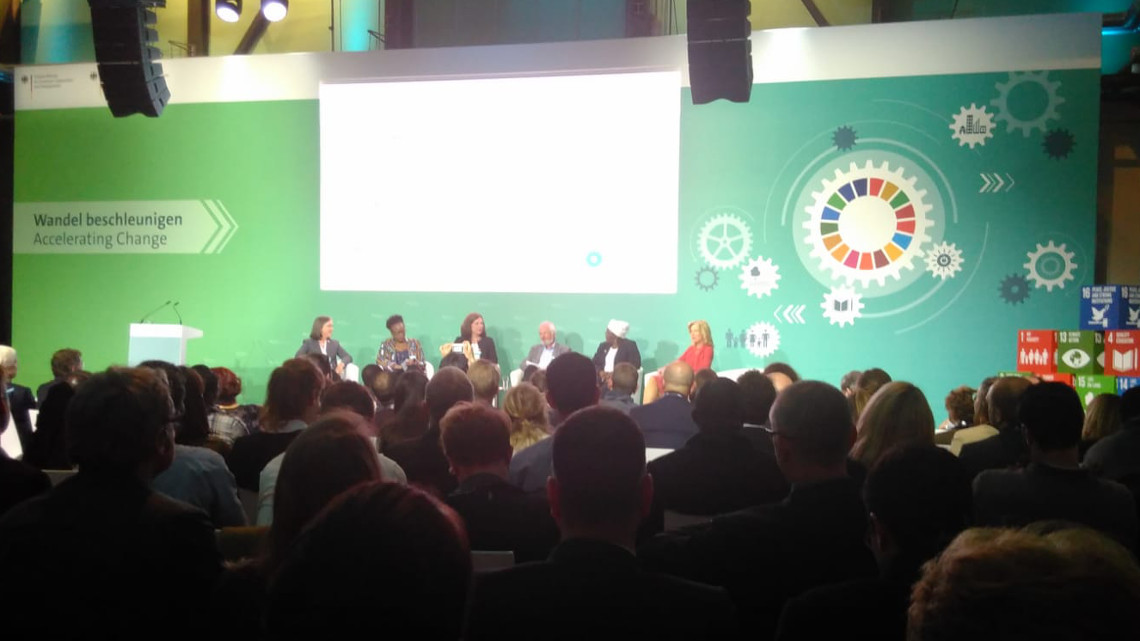Successful sustainable development
In early November, international experts from Ghana, Colombia and Germany gathered in Berlin to discuss the state of the implementation of the sustainable development goals.

More than 400 experts gathered at the EUREF campus in Berlin Schöneberg on 5 November to discuss and compare the state of the Agenda 2030 for sustainable development on an international level. Three years after the approval of the agenda, there is clear progress regarding implementation. However, in order to fully realize and achieve these goals, the respective efforts will have to be increased. The event was hosted by the Federal Ministry for the Environment, Nature Conservation and Nuclear Safety (BMU) and the Federal Ministry for Economic Cooperation and Development (BMZ). The BMZ supports developing and emerging countries in implementing the Agenda 2030 and the BMU is contributing to the SDGs via its international climate protection initiative.
Ecological transformation is a societal project
Environment minister Svenja Schulze opened the event, stressing that implementing the Agenda 2030 and its 17 Sustainable Development Goals (SDGs) is vital “for people and nature to be better off in 2030. An ambitious sustainability policy is our common goal and the Agenda 2030 is our compass.” She highlighted several key messages for the audience: a modern economic policy needs to be sustainability-focused, companies have an ecological responsibility, and there is a clear need for more investment in sustainable and social innovation, especially during market uptake. And most importantly: achieving this ecological transformation is a societal project. Schulze’s BMU is currently preparing a climate protection law with concrete objectives and targets for transport, buildings, industry and agriculture. The aim is to adopt the law in 2019.
Public needs to be made aware of SDGs
According to the BMZ, despite positive trends and global efforts, progress towards achieving the SDGs is still inadequate: although the proportion of the world's absolute poor has fallen from 26.9% in 2000 to 9.2%, at the same time, the number of starving people has risen again in the last three years, especially in sub-Saharan Africa and South Asia. The likelihood of limiting global warming to 1.5 degrees Celsius is diminishing, and more than eight million tonnes of plastic waste continue to enter the oceans every year. Norbert Barthle, parliamentary state secretary at the BMZ pointed out that only 12% of the German public are aware of the SDGs. “We need to raise awareness for these goals, we need to make them the guiding principles of our policies”, said Barthle. Both BMU and BMZ strive to achieve climate neutrality for their ministries by 2020.
Holistic view of SDGs and empowerment of women are crucial
During the panel discussion, policy officials and climate experts from Ghana, Colombia, and Germany shared the stage. The discussions revealed two main issues: all 17 SDGs have to be thought of as a unit to ensure policy coherence, and the empowerment of women is essential to achieving the goals. Paula Caballero, Former Chief Negotiator for the SDGs from Colombia criticized that the global community is currently not living up to the potential of the SDGs. “We need to embrace them, we need more people to ‘own’ the SDGs – they are a universal agenda for the people”, stressed Caballero. Hajia Alima Mahama, Minister of Local Government and Rural Development from Ghana identified leadership and the empowerment of women as critical factor for a successful implementation of the SDGs.
Taking stock of the implementation
At the next UN Summit on Sustainable Development in New York in September 2019, Heads of State and Government will meet for the first time to take stock of the implementation of Agenda 2030. This Summit will have a crucial role to play and should send the strongest possible political signal from Heads of State and Government for accelerated economic and social change.
lg


